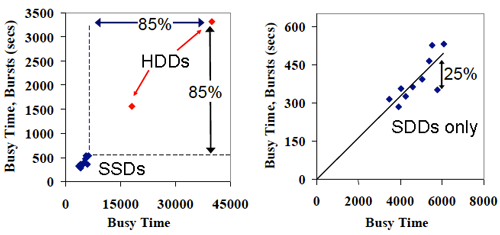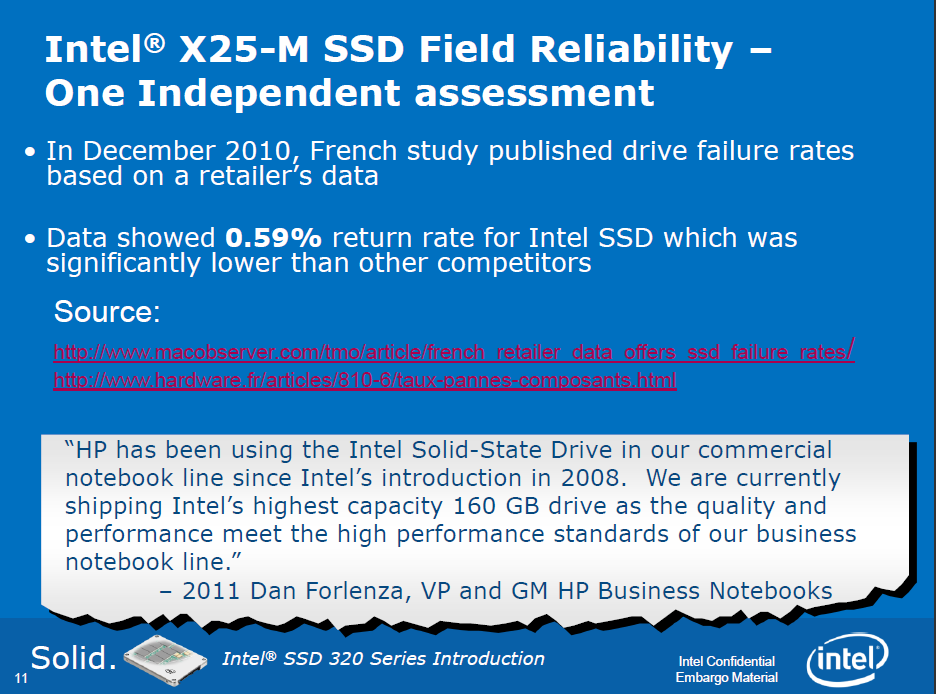Investigation: Is Your SSD More Reliable Than A Hard Drive?
Is Reliability Important?
Despite SLC-based drives accounting for only a fraction of the NAND market, we have much more data on SLC-based SSDs than we do on those using MLC technology. Even though our data set is one-twentieth the size of previous studies on hard drives, our information starts to suggest that SLC-based SSDs are no more reliable than SAS and SATA hard drives.
If you are a consumer, this has major implications. SSD makers have been trying to emphasize that they're offering two major benefits: better performance and better reliability. However, if the data on a SSD is no safer than it is on a hard drive, then performance is the real reason you’d want to explore solid-state storage.
We're not saying that the performance of SSD isn't important (or impressive). However, as a technology, SSDs generally fall within a narrow performance spectrum. If you were to plot the speed of hard drives against solid-state drives, you would find that a low-end SSD performs about 85% faster than a hard drive. A high-end SSD only commands an 88% speed advantage.
That slim margin for differentiation is why companies like Intel preaching the message of reliability instead. As recent as the press briefing ahead of its SSD 320 launch, the company tried to hammer its point home, leaning heavily on the Hardware.fr numbers as backup. Ironically, Intel's own comparatively good reputation is why we have so much information on its SSDs. But the numbers in the field don't seem to match.
SSD performance is only going to improve, while more advanced manufacturing technology continues to push prices down. However, that means need to continue differentiating in other ways. We have to imagine that, so long as new SSDs (even the most highly-regarded ones) keep turning up with show-stopping bugs, the people who demand the utmost in data availability will continue regarding them as a maturing segment. That's why we think reliability is going to have to be the focus moving forward.
Intel gave its customers a massive dose of confidence when it upgraded the SSD 320's warranty from three years to five a couple of months back. Competing drives based on SandForce's first- and second-gen mainstream controllers and Marvell's own 6 Gb/s SSD controller are covered by three-year guarantees. Enterprise-class hard drives are generally covered by five-year warranties, too. Clearly, the impetus is on SSD vendors to sell the most reliable products possible to minimize support costs over those three or five years. But it's of course difficult to overlook the teething pains new SSDs seem to suffer as vendors fiddle with the knobs and dials that simultaneously affect performance.
Get Tom's Hardware's best news and in-depth reviews, straight to your inbox.
Current page: Is Reliability Important?
Prev Page Softlayer: Roughly 5000 SSDs! Next Page Decrypting Failure Statistics: ZT Systems (~155 000 SSDs)-
hardcore_gamer Endurance of floating gate transistor used in flash memories is low. The gate oxide wears out due to the tunnelling of electrons across it. Hopefully phase change memory can change things around since it offers 10^6 times more endurance for technology nodesReply -
acku Reply10444003 said:Endurance of floating gate transistor used in flash memories is low. The gate oxide wears out due to the tunnelling of electrons across it. Hopefully phase change memory can change things around since it offers 10^6 times more endurance for technology nodes
As we explained in the article, write endurance is a spec'ed failure. That won't happen in the first year, even at enterprise level use. That has nothing to do with our data. We're interested in random failures. The stuff people have been complaining about... BSODs with OCZ drives, LPM stuff with m4s, the SSD 320 problem that makes capacity disappear... etc... Mostly "soft" errors. Any hard error that occurs is subject to the "defective parts per million" problem that any electrical component also suffers from.
Cheers,
Andrew Ku
TomsHardware.com -
slicedtoad hacker groups like lulsec should do something useful and get this kind of internal data from major companies.Reply -
jobz000 Great article. Personally, I find myself spending more and more time on a smartphone and/or tablet, so I feel ambivalent about spending so much on a ssd so I can boot 1 sec faster.Reply -
You guys do the most comprehensive research I have ever seen. If I ever have a question about anything computer related, this is the first place I go to. Without a doubt the most knowledgeable site out there. Excellent article and keep up the good work.Reply
-
acku slicedtoadhacker groups like lulsec should do something useful and get this kind of internal data from major companies.Reply
All of the data is so fragmented... I doubt that would help. You still need to take a fine toothcomb to figure out how the numbers were calculated.
gpm23You guys do the most comprehensive research I have ever seen. If I ever have a question about anything computer related, this is the first place I go to. Without a doubt the most knowledgeable site out there. Excellent article and keep up the good work.
Thank you. I personally love these type of articles.. very reminiscent of academia. :)
Cheers,
Andrew Ku
TomsHardware.com -
K-zon I will say that i didn't read the article word for word. But of it seems that when someone would change over from hard drive to SSD, those numbers might be of interest.Reply
Of the sealed issue of return, if by the time you check that you had been using something different and something said something else different, what you bought that was different might not be of useful use of the same thing.
Otherwise just ideas of working with more are hard said for what not to be using that was used before. Yes?
But for alot of interest into it maybe is still that of rather for the performance is there anything of actual use of it, yes?
To say the smaller amounts of information lost to say for the use of SSDs if so, makes a difference as probably are found. But of Writing order in which i think they might work with at times given them the benefit of use for it. Since they seem to be faster. Or are.
Temperature doesn't seem to be much help for many things are times for some reason. For ideas of SSDs, finding probably ones that are of use that reduce the issues is hard from what was in use before.
When things get better for use of products is hard placed maybe.
But to say there are issues is speculative, yes? Especially me not reading the whole article.
But of investments and use of say "means" an idea of waste and less use for it, even if its on lesser note , is waste. In many senses to say of it though.
Otherwise some ideas, within computing may be better of use with the drives to say. Of what, who knows...
Otherwise again, it will be more of operation place of instances of use. Which i think will fall into order of acccess with storage, rather information is grouped or not grouped to say as well.
But still. they should be usually useful without too many issues, but still maybe ideas of timiing without some places not used as much in some ways. -
cangelini To the contrary! We noticed that readers were looking to see OWC's drives in our round-ups. I made sure they were invited to our most recent 120 GB SF-2200-based story, and they chose not to participate (this after their rep jumped on the public forums to ask why OWC wasn't being covered; go figure).Reply
They will continue to receive invites for our stories, and hopefully we can do more with OWC in the future!
Best,
Chris Angelini -
ikyung Once you go SSD, you can't go back. I jumped on the SSD wagon about a year ago and I just can't seem to go back to HDD computers =Reply

